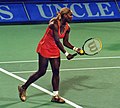| Laureus World Sports Award for Sportswoman of the Year | |
|---|---|
 Simone Biles, 2025 winner | |
| Awarded for | "the most remarkable women from the world of sport along with the greatest achievements fans have admired throughout the year." [1] |
| Location | Madrid (2025) |
| Presented by | Laureus Sport for Good Foundation |
| First award | 2000 |
| Currently held by | |
| Most awards | (4 awards each) |
| Most nominations | (5 nominations each) |
| Website | Official website |
The Laureus World Sports Award for Sportswoman of the Year is an annual award honouring the achievements of individual women from the world of sports. It was first awarded in 2000 as one of the seven constituent awards presented during the Laureus World Sports Awards. [1] The awards are presented by the Laureus Sport for Good Foundation, a global organisation involved in more than 150 charity projects supporting 500,000 young people. [2] The first ceremony was held on 25 May 2000 in Monte Carlo, at which Nelson Mandela gave the keynote speech. [3] As of 2020 [update] , a shortlist of six nominees for the award comes from a panel composed of the "world's leading sports editors, writers and broadcasters". [1] The Laureus World Sports Academy then selects the winner who is presented with a Laureus statuette, created by Cartier, at an annual awards ceremony held in various locations around the world. [4] The awards are considered highly prestigious and are frequently referred to as the sporting equivalent of "Oscars". [5] [6] [7]
Contents
The inaugural winner of the award was American sprinter Marion Jones, who, at the time of the presentation, was considered to be "the world's dominant sprinter". [5] She later admitted to having taken performance-enhancing drugs and, along with being stripped of her Olympic medals by the International Olympic Committee in 2007, [8] her Laureus Award and nominations (2001 and 2003) were rescinded. [9] American sportswomen have won more awards and nominations than any other nationality, with eleven wins and thirty-eight nominations. American tennis player Serena Williams and American artistic gymnast Simone Biles holds the record for the most awards with four. [10] The 2025 award was won by American artistic gymnast Simone Biles for the fourth time. [11]

























